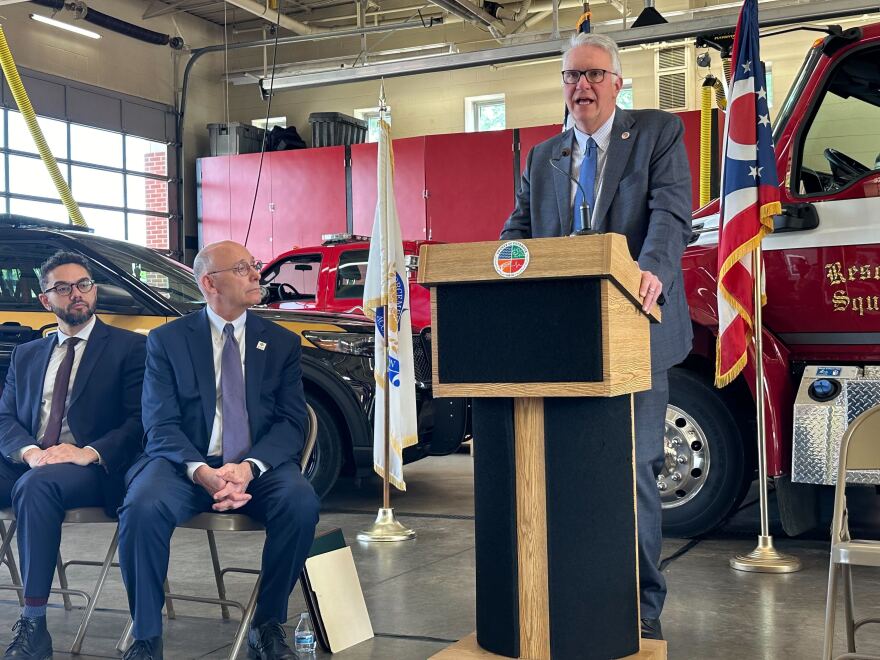Cleveland Heights, Richmond Heights, South Euclid and University Heights on May 7 announced plans to adopt a Shaker Heights pilot program using social workers to respond to mental health emergencies.
The program, called First CALL (Crisis Assistance and Local Linkage), aims to improve each city's response to crisis emergencies by embedding a full-time social worker with police and fire departments. Shaker Heights began this practice in 2022.
Having a social worker available alongside police and firefighters allows the city to use the best resources available to respond to these particular emergencies, said Shaker Heights Mayor David Weiss.
This approach "enables our first responders to be redeployed to other, more appropriate situations that may be occurring in our communities, and then relying on the mental health professionals to address the issue in an immediate short term,” he said.
The program was developed as Shaker Heights was seeing an increase in 911 calls due to mental health issues, Weiss added. However, callers did not always get the help they needed as the police and fire departments did not have the right training and experience to address those crises.
"What we were finding is that calls would come in and they would be addressed briefly, and the person wasn't always linked to the right services and would end up right back on the street and we would see that person again," Weiss said.
Shaker Heights responded by hiring a licensed social worker, Annette Amistadi, to be embedded with the city's first responders. She responded to mental health crisis calls, engaging with the person in crisis and the first responders on scene to determine the best course of action.
Sometimes the best course of action is to listen, Amistadi said.
“A lot of times, someone in crisis just needs to be heard, and so our mental health professionals and our peers are trained in that active listening and de-escalation to really get what that person needs, so that way they can refer them to the right service," she noted.
In addition to social workers, the program will also employ peer support to help with these calls. A peer support is somebody with lived experience. This could be someone who has dealt with mental health or addiction issues, been involved in the criminal justice system due to similar problems, or someone who has helped a member of their family through such difficulties, Amistadi said.
Chris Ronayne, Cuyahoga County Executive, said he's been impressed with Shaker Heights' program.
"Their actual data on what they accomplished was further inspiring," he said during a news conference at the Shaker Heights fire department announcing the collaboration. "My takeaway was that persons with mental health challenges were better served in this community."
He added that Amistadi, who leads the Shaker Heights effort, has told him the program has helped avert seven suicides over the past two years. In 2023, the Shaker Heights program also had 645 referrals and completed 730 follow-ups from those responses.
The fact that these five cities share the same dispatch center, Chagrin Valley Dispatch in Bedford, made a collaborative effort a natural fit, Weiss said.
"The idea had always been that we would eventually expand the program to include those five municipalities," he said.
First CALL will be grant-supported for the first two years, receiving funding from partner cities and support from Cuyahoga County, federal and local agencies and foundations. Over the next two years the Alcohol, Drug Addiction & Mental Health Services (ADAMHS) Board of Cuyahoga County will provide more than $500,000 and the U.S. Department of Justice Office of Community Oriented Policing Services will provide nearly $400,000, with another $200,000 coming from the Gund Foundation and $75,000 from the county.
The program is expected to begin this summer with four licensed mental health professionals and three peer support workers to be hired, according to a news release. Staff will work with Amistadi to cover all five communities, while a licensed mental health professional will be assigned to Chagrin Valley Dispatch.
Recovery Resources, a program of the MetroHealth System, will staff the additional mental health professionals, the release said. The trained peer support personnel, each of whom has received mental health services, will work under the supervision of licensed mental health professionals.







